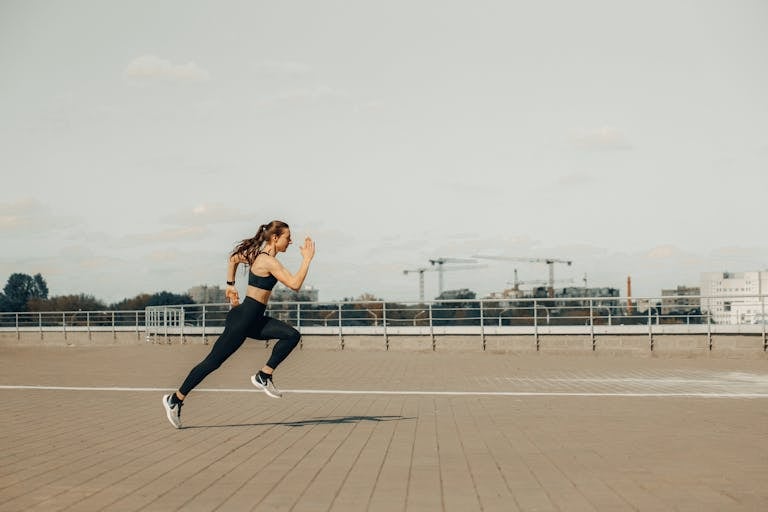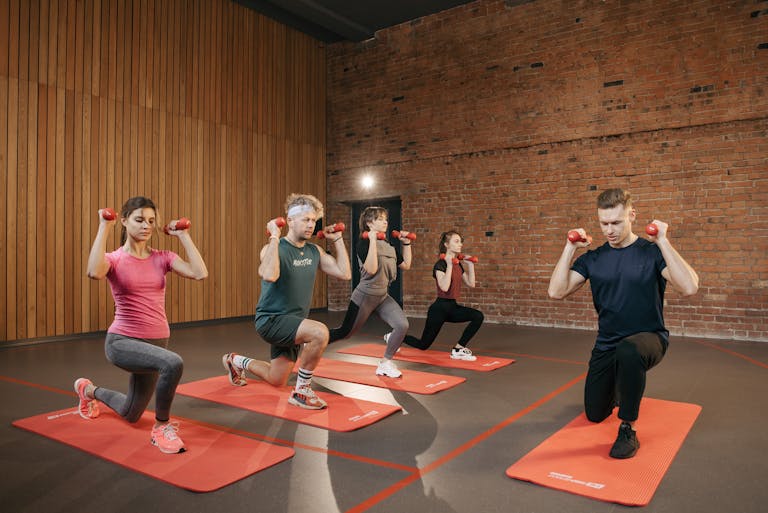Over 100 trillion bacteria in your gut microbiome directly impact how fast your muscles recover after exercise. While perfecting your form and tracking your macros, you might be overlooking one of the most powerful tools for more rapid recovery in your digestive system.
Antibiotics and the health of your stomach, intestines, colon, and large intestine can significantly impact the balance of your gut microbiome and, as a result, your workout recovery.
Many fitness enthusiasts spend hours researching the perfect pre-workout supplement or post-exercise protein shake. Few consider how gut health affects their ability to bounce back from intense training sessions. The connection between your digestive system and workout recovery runs deeper than you think, affecting everything from inflammation to nutrient absorption.
This guide will explain the science behind gut health and exercise recovery. It will also teach you how to harness the power of probiotics and anti-inflammatory foods to fuel your fitness progress and provide practical strategies for optimizing your gut microbiome and recovery routine.
What is Gut Health and Why Does it Matter?
Gut health refers to the balance and function of bacteria in your digestive tract. Your gut microbiome comprises trillions of microorganisms, bacteria, viruses, and fungi that work together to support your overall health. If the gut becomes unhealthy due to an imbalance of these microbes, treatment strategies such as dietary changes or probiotics can help restore a healthy microbiome.
A healthy gut does several critical functions that directly impact your fitness performance:
Nutrient Absorption: Your gut breaks down food and absorbs essential nutrients like protein, vitamins, and minerals. When your digestive system works optimally, your body can more effectively use the nutrients needed for muscle repair and energy production.
Immune System Support: 70% of your immune system lives in your gut. A balanced microbiome helps regulate immune responses, reducing unnecessary inflammation that can slow recovery.
Inflammation Control: Beneficial bacteria in your gut produce anti-inflammatory compounds that help manage the natural inflammatory response to exercise. This is essential for proper healing without prolonged soreness.
For active individuals, these functions become even more critical. Your muscles need specific nutrients to rebuild and strengthen after workouts, and your immune system needs to manage exercise-induced inflammation. An unhealthy gut microbiome, characterized by an imbalance of good and bad bacteria, can lead to health issues and slower recovery.
The Science Behind Gut Health and Workout Recovery
Research shows a strong connection between gut health and athletic performance. A balanced gut microbiome helps process nutrients more efficiently, so your muscles get the building blocks they need to repair and grow.
The gut-muscle axis plays a big role in recovery. When you exercise, your muscles experience microscopic damage that triggers an inflammatory response. Intense exercise can break muscle fibers, and they need to be repaired. Some inflammation is necessary for adaptation and growth, but excessive or prolonged inflammation can delay recovery and increase injury risk. Research shows that inadequate recovery can lead to increased fatigue and leave athletes feeling fatigued, highlighting the importance of proper recovery strategies.
Probiotics, the good bacteria in your gut, help regulate this inflammatory response. Studies show athletes who consume probiotics experience less muscle soreness and faster recovery times than those with less diverse gut microbiomes. Proper recovery time and achieving a resting state are essential for muscle repair and adaptation.
Your gut also produces essential compounds that support recovery:
- Short-chain fatty acids: These molecules reduce inflammation and support immune function, especially in the short term after exercise, to support immediate recovery needs
- Neurotransmitters: Your gut produces serotonin and other chemicals that influence mood and stress response
- Antioxidants: Beneficial bacteria help your body produce natural antioxidants that combat exercise-induced oxidative stress
When your gut microbiome is imbalanced, these beneficial processes become less efficient. This can extend recovery times and reduce your ability to adapt to training.
How Probiotics Can Reduce Inflammation Post-Workout
Probiotics are live good bacteria that support gut health and overall wellness. These tiny allies help maintain the delicate balance of your gut microbiome, which is especially important when exercise temporarily disrupts your digestive system.
After intense workouts, your body naturally produces inflammatory markers as part of the recovery process. Probiotics help modulate this response, reducing excessive inflammation while preserving the beneficial aspects needed for muscle adaptation.
Key ways probiotics support post-workout recovery:
Enhanced Protein Synthesis: Certain probiotic strains improve your body’s ability to break down and use dietary protein, making your post-workout nutrition more effective.
Reduced Inflammatory Markers: Studies show that regular probiotic consumption can lower levels of inflammatory compounds like C-reactive protein and interleukin-6.
Improved Gut Barrier Function: Exercise can temporarily increase intestinal permeability. Probiotics help maintain a strong gut barrier, preventing harmful substances from entering your bloodstream and triggering unnecessary inflammation. You can get probiotics through fermented foods rich in beneficial bacteria, like yogurt, kefir, sauerkraut, and kimchi. For convenience, consider adding a high-quality probiotic supplement to your routine, especially during intense training.
Timing matters when using probiotics for recovery. Try to consume probiotic-rich foods or supplements within a few hours of your workout, when your gut is most receptive to good bacteria.
Fermented Foods for Recovery
Fermented foods are a powerhouse for supporting a healthy gut microbiome and speeding up workout recovery. Yogurt, sauerkraut, kimchi, and kefir are packed with beneficial bacteria and live microorganisms that help populate your gut with good bacteria. This boost of good bacteria is essential for maintaining a balanced gut microbiome, which plays a big role in digestion, immune function, and overall health.
After intense exercise, your body experiences muscle soreness and inflammation as part of the natural recovery process. Fermented foods can help reduce this muscle soreness by supporting the growth of good bacteria that produce anti-inflammatory compounds. These compounds help your body manage inflammation better so you can recover faster after a challenging workout.
In addition to their probiotic benefits, fermented foods are rich in antioxidants that help combat exercise-induced oxidative stress. This means less cellular damage and quicker return to peak performance. Including fermented foods in your diet supports your gut health and gives your body the tools to recover efficiently and maintain overall health.
Try adding a serving of fermented foods to your post-workout meal or snack. Whether a spoonful of kimchi with your protein bar or a cup of yogurt in your recovery smoothie, these foods can make a big difference in how you feel after exercise.
Diet Tips for a Healthier Gut and Faster Recovery
Your food choices directly affect the composition and recovery time of your gut microbiome. Focus on foods that nourish good bacteria and avoid those that feed harmful bacteria.
Gut-Friendly Foods to Eat:
- Fiber-rich vegetables: Broccoli, asparagus, and leafy greens are rich in prebiotic fibers that are food for the good bacteria in your gut. By feeding these bacteria, these vegetables help maintain a healthy digestive system, regular bowel movements, and even boost your immune function.
- Fermented foods: Foods like yogurt, kefir, miso, and tempeh are rich in live probiotics, good bacteria that improve gut health. These foods can help balance your gut microbiome, aid digestion, and enhance nutrient absorption. They are a great addition to your diet for overall wellness.
- Antioxidant-rich fruits: Berries, cherries, and pomegranates are loaded with antioxidants that protect your cells from damage caused by exercise-induced oxidative stress. By reducing inflammation and supporting recovery, these fruits fuel your body and promote long-term health.
- Omega-3 sources: Fatty fish like salmon and mackerel, and plant-based options like walnuts and flaxseeds are high in omega-3 fatty acids. These healthy fats have anti-inflammatory properties, support heart and brain health, and aid muscle recovery after physical activity.
- Whole grains: Oats, quinoa, and brown rice are excellent sources of whole grains that provide sustained energy throughout the day. They’re also rich in prebiotic fibers that help feed the good bacteria in your gut and promote a healthy digestive system.
Targeting different muscle groups with proper nutrition can help reduce pain and speed up recovery, especially after intense workouts that may leave you sore in areas like quads, hamstrings, or glutes.
Foods to Limit:
- Processed foods: These often contain high levels of preservatives, artificial flavors, and other additives that can disrupt the natural balance of gut bacteria. Over time, this imbalance can lead to digestive issues, reduced nutrient absorption, and even contribute to long-term health problems like inflammation or metabolic disorders.
- Excessive sugar: Consuming too much sugar can feed bad bacteria, causing them to thrive while diminishing the population of good bacteria. This imbalance may lead to increased inflammation, digestive discomfort, and even a higher risk of chronic diseases like obesity and diabetes.
- Artificial sweeteners: While marketed as a healthier alternative to sugar, some studies suggest artificial sweeteners can negatively impact gut microbiome diversity. They may reduce good bacteria and sometimes contribute to glucose intolerance and other metabolic issues.
- Highly processed meats often contain nitrates, preservatives, and other additives that can increase inflammatory markers in the body. Additionally, their consumption has been linked to reduced good bacteria, potentially impacting gut health and overall well-being over time.
Sample Recovery Meal: Create a gut-friendly smoothie with Greek yogurt, spinach, berries, ground flaxseed, and a small amount of honey. This combination provides probiotics, prebiotics, antioxidants, and anti-inflammatory compounds to support gut health and muscle recovery. Include these nutrients after working different muscle groups to ease muscle soreness, minimize pain, and support faster recovery.
Plan your meals to include at least one gut-supporting food with each meal and aim for variety to promote microbiome diversity.
Active Recovery Techniques to Support Gut and Muscle Health
Active recovery isn’t just about giving your muscles a break—it’s also a powerful way to support your gut health and overall well-being. Techniques like foam rolling, stretching, and light physical activity can help reduce muscle soreness, improve blood flow, and promote the growth of good bacteria in your gut microbiome.
Foam rolling is a simple yet effective way to increase blood flow to tired muscles, helping to flush out waste products and speed up recovery. This increased circulation not only aids muscle repair but also supports the delivery of nutrients throughout the body, including the gut.
Stretching after a workout helps maintain flexibility and reduce muscle tension, lowering the risk of injury and keeping muscles healthy. Gentle stretching also helps your body relax, reducing stress—a key factor in maintaining a healthy gut microbiome.
On your rest days, light physical activity like walking, cycling, or swimming can stimulate blood flow and help your body recover without putting extra strain on your muscles. This kind of movement also supports gut health by promoting the growth of healthy bacteria and reducing inflammation.
Consider adding probiotics and prebiotics to your diet to boost your recovery further. These nutrients help feed the good bacteria in your gut, promoting a healthy gut microbiome and supporting your body’s natural recovery processes.
Combining active recovery techniques with gut-friendly nutrition will help you recover faster, reduce your risk of injury and illness, and stay on track with your fitness goals.
Lifestyle Habits That Support Gut Health and Recovery
Beyond nutrition, several lifestyle habits can enhance gut health and workout recovery. These habits work with dietary changes to optimize your body’s repair processes.
Hydration: Adequate water intake supports digestion and helps transport nutrients to recovering muscles. Aim for at least half your body weight in ounces of water daily, increasing during intense training.
Quality Sleep: Your gut microbiome follows a circadian rhythm similar to your sleep-wake cycle. Poor sleep disrupts this balance and can impede recovery. Aim for nightly 7-9 hours of quality sleep for optimal gut health and muscle recovery. Good sleep also helps with hormone regulation, immune function, and mood—all important for recovery and overall well-being.
Stress Management: Chronic stress affects gut bacteria composition and increases inflammatory markers. Try:
- Deep breathing exercises
- Meditation or mindfulness practices
- Regular yoga sessions
- Time in nature
Exercise Moderation: While exercise is good for gut health, too much training can disrupt your microbiome and increase intestinal permeability. Balance intense training with rest days and listen to your body. The right balance of exercise and rest is key to a healthy life. Cooling down after each exercise session is crucial for optimal recovery.
Rest and recovery needs vary depending on age and stage of development, so most people benefit from tailoring their routines to their needs.
Consistent Meal Timing: Eating at regular intervals helps your gut’s natural rhythms. Try to eat your main meals simultaneously each day and avoid late-night eating, which can disrupt sleep and digestion.
These lifestyle habits create a foundation that supports gut health and exercise recovery, amplifying your nutrition benefits.
Tracking Progress: Measuring Gut Health and Recovery Gains
Tracking your progress is key to optimising gut health and exercise recovery. By measuring key indicators, you can make informed decisions about your diet, physical activity, and recovery strategies to support your overall health and fitness.
One way to measure gut health is through stool tests, which can show the presence and diversity of good bacteria in your gut microbiome. These tests give you valuable insights into how your diet and lifestyle affect your gut and allow you to make targeted changes for better results.
Blood work is another tool for tracking inflammation and oxidative stress markers. By monitoring these indicators, you can see how well your body is recovering from exercise and whether your current routine supports your health.
Don’t forget the power of symptom tracking. Keeping a journal or using a mobile app to record changes in digestion, energy levels, muscle soreness, and overall well-being can help you spot patterns and see what’s working or what needs to change.
Tracking your nutrition, physical activity, and recovery habits gives you a holistic view of the factors that affect your gut health and recovery. By monitoring your progress, you can adjust your approach and make sure you’re nurturing good bacteria, reducing inflammation, and maximising recovery gains. This proactive approach will help you achieve your fitness goals and long-term health and resilience.
Gut Health for Recovery
The connection between gut health and workout recovery is a powerful but often overlooked aspect of fitness optimization. By supporting your gut microbiome with targeted nutrition and lifestyle habits, you can reduce inflammation, improve nutrient absorption, and speed up your body’s repair processes.
Start by adding one or two gut-friendly foods into your daily routine, such as adding Greek yogurt to your post-workout meal or including fermented vegetables with dinner. Small, consistent changes produce more sustainable results than significant changes.
Building a healthy gut microbiome takes 2-4 weeks to see significant changes; some people may see improvements in as little as one week. Be patient with the process and focus on consistency, not perfection. Your improved recovery, energy, and overall well-being will be worth the investment.
Take action today by reviewing your current recovery routine. Are you supporting your gut health alongside your training? Consider what gut-friendly foods you can add to your following grocery list and what lifestyle habits need attention.
Ready to learn more about nutrition and recovery? Sign up for our newsletter to get expert advice, evidence-based tips, and practical guides delivered to your inbox. Your strongest, healthiest self is waiting.
Medical Disclaimer:
This content is for informational purposes only and is not intended as medical advice, diagnosis, or treatment. Always consult with a qualified healthcare professional before making any changes to your diet, exercise, or health routine. Never disregard professional medical advice or delay seeking it because of something you have read on this site.







